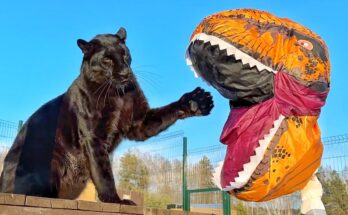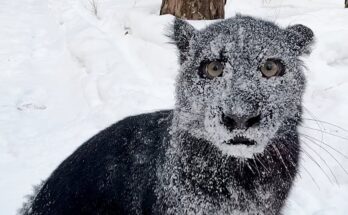Can a Black Panther Be Jealous of a Dog? Understanding Feline Behavior
The idea of a black panther feeling jealous of a dog owned by its caretaker is an intriguing concept, but it requires an understanding of animal behavior, particularly in big cats. While black panthers (melanistic leopards or jaguars) are highly intelligent and emotional animals, their behavior differs significantly from domesticated pets like dogs. Here’s an exploration of whether a black panther could exhibit jealousy and how such a dynamic might play out.

1. Emotional Complexity in Big Cats
Black panthers, like other big cats, are capable of forming strong bonds with their caretakers. They can display affection, curiosity, and even possessiveness. However, their emotions are rooted in instinct and survival rather than the complex social dynamics seen in domesticated animals. While they may not experience jealousy in the same way humans or dogs do, they can exhibit behaviors that resemble jealousy, such as attention-seeking or territoriality.
2. Attention-Seeking Behavior
If a black panther perceives that its caretaker is giving more attention to a dog, it might display behaviors aimed at reclaiming that attention. For example, the panther could become more vocal, rub against the caretaker, or position itself between the dog and the human. These actions are not necessarily driven by jealousy but rather by a desire to maintain its status and bond with the caretaker.
3. Territorial Instincts
Black panthers are inherently territorial animals. If a dog is introduced into their environment, the panther might see the dog as an intruder or competitor for resources, including the caretaker’s attention. This could lead to defensive or aggressive behaviors, such as growling, stalking, or marking territory. These actions are more about asserting dominance than feeling jealous.
4. Social Dynamics
Unlike dogs, which are pack animals and thrive on social hierarchies, black panthers are solitary by nature. They do not have the same social structures or emotional dependencies as dogs. Therefore, their reactions to a dog’s presence are more likely rooted in instinctual responses rather than emotional jealousy.
5. Managing the Relationship
If a black panther and a dog share the same environment, it is crucial to manage their interactions carefully. The caretaker should ensure that both animals feel secure and receive equal attention. Establishing clear boundaries and providing separate spaces can help prevent conflicts and reduce stress for both the panther and the dog.
Conclusion
While a black panther may exhibit behaviors that resemble jealousy, these actions are more likely driven by instinctual needs for attention and territory rather than complex emotions. Understanding the panther’s natural behavior and providing a balanced environment can help maintain harmony between the panther, the dog, and their caretaker. Always remember that black panthers are wild animals and require specialized care and respect for their instincts and needs.


